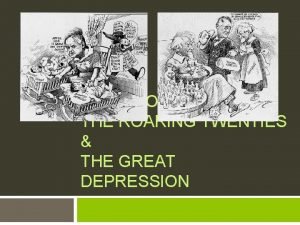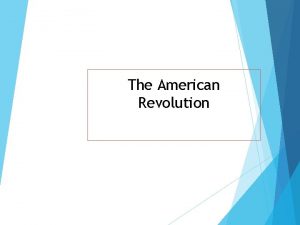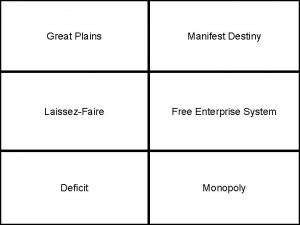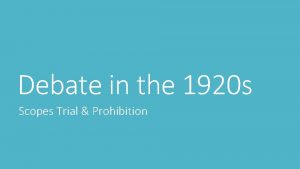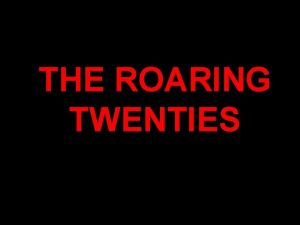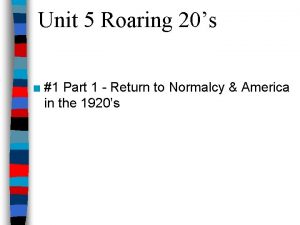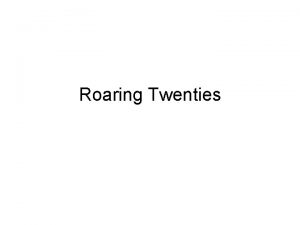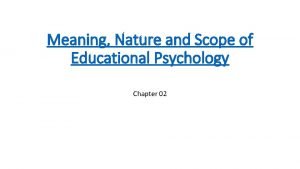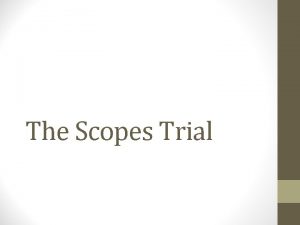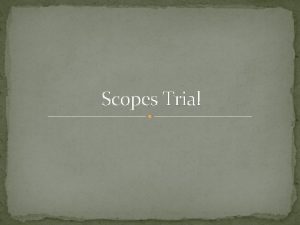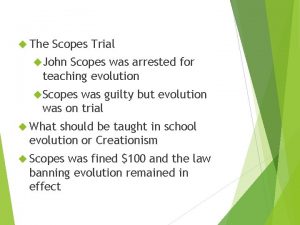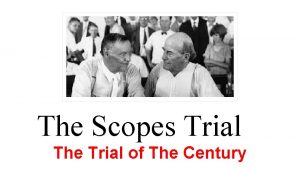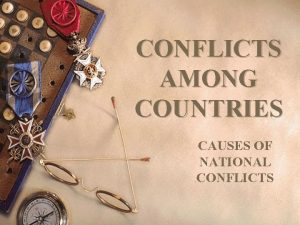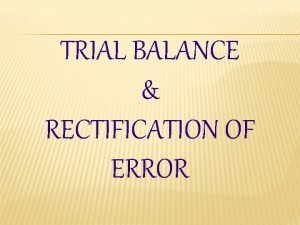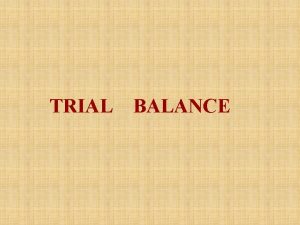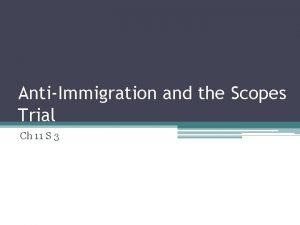Conflicts of the 20s The Scopes Trial Description













- Slides: 13

Conflicts of the 20’s

The Scopes Trial • Description • Court case in Tennessee in 1925 – crime to teach evolution. • John Scopes – biology teacher was arrested for reading a passage referring to evolution. • This was a fight about evolution and religion in public schools and American society. • Bryan was a Bible expert that acknowledged that the bible could be interpreted in diffrent ways. • Scopes found guilty.

The Scopes Trial • Causes • Tensions were growing between those who believed in science and those who believed in religion. • Issue on separation between church and state. • Pursuit of political careers was a way to gain attention and notariety.

The Scopes Trial • Consequences • States became tolerant of teaching evolutionary theory. • Ruined reputations. • This is still a relevant issue. Should there be a separation between church and state?

The Klan Rises Again • Description • 1915 they reimerged. • 100 percent Americanism • Believed in keeping blacks « in their place » and keeping foreign-born people out of the country. • Klan members were « plain people , not highly cultured, not overly intellectualized » They were threatened by changes in American society.

The Klan Rises Again • Causes • Racists felt African-Americans would attack white communities because many white men were away at war. • They resented the growing pride in the African. American communities. • African Americans were beginning to serve the country and making decent wages.

The Klan Rises Again • Consequences • Membership peaked in the mid 1920’s • Racial violence • They tried to invluence national, state, and local politics. • Crimes committed by Klan leaders in Indiana resulted in major decrease in their power nationwide.

The Prohibition Experiment • Description • 18 th Amendment – prohibited sale, manufacture, transport or import of alcoholic beverages. • Drinkers went underground to hidden saloons and night clubs called speakeasies. • People breaking the law. • Brought about organized crime – gangs selling liquor.

The Prohibition Experiment • Causes • Reformers felt liquor was a prime cause of corruption. • The Woman’s Christian Temperance Union considered drinking a sin. • Certain areas of the country considered prohibition a state law. • Most support came from the rural South and West (Protestants who opposed alcohol consumption)

The Prohibition Experiment • Consequences • Failure • People grew tired of the government meddeling in their business. • Police and judges were being bribbed. People found creative ways to hide the liquor. • Nearly every major city had gangs that sold liquor. • Chicago – Al Capone – he killed his competition. • Corruption got worse.

The Flapper • Description • Emancipated young woman who embraced the new fashions and urban attitudes of the 1920’s. • Image of rebellion • Women becoming assertive. • Women wanting equal status as men, smoking and drinking in public. • Changing attitudes toward marriage.

The Flapper • Causes • 19 th Amendment to the constitution – the right to vote for women • Women feel empowered. • Women have greater economic freedom because of changing roles during the war.

The Flapper • Consequences • Older suffragettes felt the younger women were being frivolous. • This caused a divide amongst the older and younger women. • Women had many obstacles and were still fighting for equal rights as men.
 Scopes monkey trial
Scopes monkey trial Scopes monkey trial apush definition
Scopes monkey trial apush definition Free enterprise
Free enterprise Scopes trial political cartoon
Scopes trial political cartoon Carboxylic acid h3o+ reaction
Carboxylic acid h3o+ reaction The roaring twenties were characterized by —
The roaring twenties were characterized by — Roaring 20s fashion
Roaring 20s fashion Roaring 20s vocabulary
Roaring 20s vocabulary Sports mania in the 1920s
Sports mania in the 1920s Demobilization and adjustment to peace 1920
Demobilization and adjustment to peace 1920 Counseling goals
Counseling goals Scopes programming language
Scopes programming language Materi pemrograman terstruktur
Materi pemrograman terstruktur Explain the scope of educational psychology
Explain the scope of educational psychology
